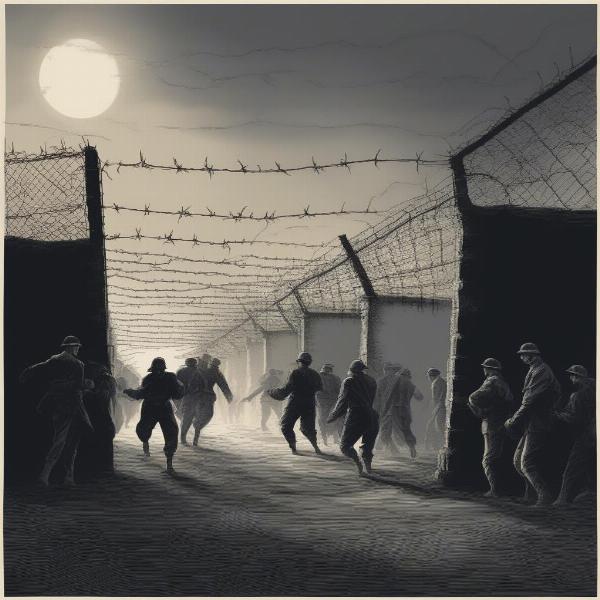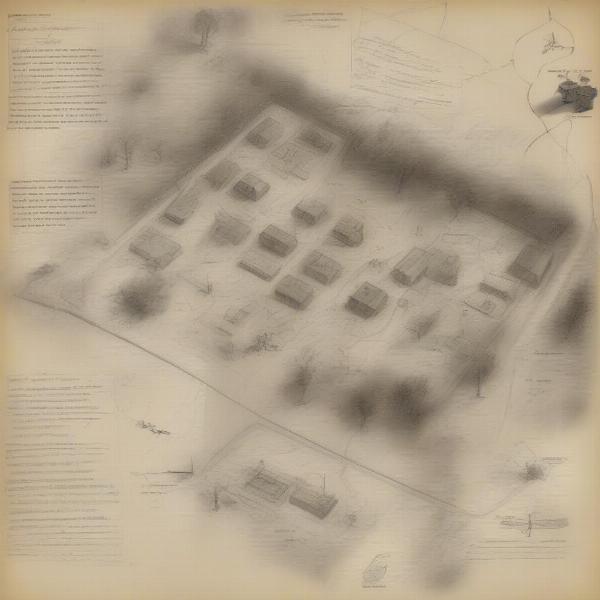The concept of a POW prisoners of war game often brings to mind intense narratives of survival, strategy, and escape against all odds. At SupremeDuelist.blog, we delve into the elements that make these games so captivating, exploring the historical context, the unique mechanics employed, and the emotional depth they offer players. This article will uncover the nuances of prisoner of war games, helping you understand what makes them compelling.
This exploration includes understanding the types of challenges players face within a POW prisoners of war game, as well as the varying approaches developers take in representing confinement and the pursuit of freedom. We will examine popular titles, discuss what makes them engaging and even consider the ethical considerations that arise when simulating the experience of war and captivity.
What Defines a POW Prisoners of War Game?
A POW prisoners of war game typically revolves around the core experience of being captured during a conflict. Unlike typical war games that focus on large-scale battles, POW games narrow the focus to the intimate struggles of individuals or small groups held captive. The games often include elements of stealth, resource management, and social interaction with fellow prisoners, all while aiming for the ultimate goal of escape. These games are not solely about combat; they are about survival, resilience, and the human spirit.
The defining characteristics often involve intricate systems that simulate the daily life of a prisoner. For example, players may need to manage their food rations, maintain their health, and interact with guards to avoid suspicion or punishment. These mechanics often require careful planning and resource allocation, offering a blend of strategy and survival elements that set them apart from other war-themed genres. The stakes are always high, emphasizing the grave situation of being a prisoner of war.
Key Mechanics in POW Games
The core gameplay in a POW prisoners of war game revolves around a number of mechanics that contribute to the overall immersive experience. These mechanics create a world where planning, resourcefulness, and risk-taking are necessary for survival and potential escape. Here are a few notable examples:
- Stealth: Avoiding detection by guards is often essential. Games may include mechanics for hiding, moving quietly, and creating diversions.
- Resource Management: Scarcity of food, water, and medical supplies requires players to carefully manage their resources, making each decision count.
- Social Interaction: Forming alliances with other prisoners, exchanging information, and navigating the prison’s social hierarchy often form a vital part of the game.
- Crafting and Engineering: The ability to craft tools and other items to aid in escape attempts adds a layer of problem-solving to the gameplay.
- Risk-Reward Systems: Many actions will carry consequences. Taking risks can lead to significant rewards or severe punishment, making each move a calculated gamble.
These mechanics are typically woven together to create a multi-layered and compelling gameplay loop. The difficulty in mastering these systems often leads to a deep sense of accomplishment when players successfully manage to evade capture or even orchestrate a daring escape. For those interested in broader historical military simulations, a [civil war secret missions game](https://supremeduelist.blog/civil-war-secret-missions-game/) can provide an intriguing contrast to the more confined experience of POW games, showing the diverse nature of strategy-focused titles.
Popular Examples of POW Games
Many games have attempted to tackle the subject of prisoners of war, each with their own approach to the unique challenges that this setting provides. Here are some popular examples:
- The Great Escape: A classic title that focuses on stealth and puzzle solving as players try to escape from a German POW camp.
- Prison Architect: Although it focuses more on the management side, this game allows players to get an in-depth look at prison systems, which are often critical to survival in POW games.
- Metal Gear Solid V: The Phantom Pain: Offers a unique take on a war narrative where the concept of extraction and rescue from captivity becomes the core mechanic.
- Various mods for strategy games: For strategy games like ‘Hearts of Iron’ and others, there are mods that can simulate the POW experience in depth.
 pow game escape concept
pow game escape concept
Each of these games provides different elements of a POW experience, from intricate escape planning to the emotional toll of being confined. Many of these titles also explore the human aspects of survival, highlighting the relationships between prisoners and the psychological effects of captivity.
The Importance of Historical Context
When creating or playing a POW prisoners of war game, it is essential to understand the historical context in which these events take place. These games are often inspired by real-world events, therefore accuracy and respectful portrayal are critical. Historical accuracy can help to ground the gameplay, while creating a more meaningful and engaging experience for the player.
This deeper understanding can also help players grasp the gravity of the situations these games are attempting to portray. The emotional impact is greatly enhanced when the player knows that such circumstances were a reality for many individuals.
“The best POW games make players feel a fraction of the stress and the emotional toll that real prisoners of war endured. It’s about more than just escape; it’s about resilience and the strength of the human spirit,” says Dr. Eleanor Vance, a historian specializing in conflict studies.
Ethical Considerations in POW Games
The sensitive nature of a POW prisoners of war game raises ethical considerations that developers must navigate. Portraying war and captivity can easily cross the line between engaging gameplay and insensitive exploitation. It’s vital to ensure that these games are developed and played with respect and sensitivity. Here are some key aspects to think about:
- Avoiding trivialization: The gravity of real-world POW experiences should be treated seriously to avoid trivializing suffering.
- Realistic portrayals: Games should avoid romanticizing or glorifying the brutality of captivity.
- Player perspective: Encouraging players to think critically about ethical dilemmas within the game can be essential.
- Inclusivity: Portrayals should be respectful of the diversity of experiences within POW camps.
When approached with awareness, POW games can be a powerful tool to educate and promote empathy. They can offer insight into history and the human condition, providing a unique perspective that is different from other war games.
Strategies for Success in POW Games
Excelling in a POW prisoners of war game requires more than just fast reflexes. It often involves strategic thinking, patience, and a willingness to adapt to changing circumstances. Here are a few tips to improve your gameplay:
- Plan Ahead: Thoroughly survey your surroundings, observe routines, and understand the best ways to execute your plan.
- Conserve Resources: Manage food, health items, and tools carefully. Waste can be fatal.
- Build Trust: Engage with other characters, build relationships, and look for help from unexpected places.
- Stay Calm: Panic can lead to poor decision-making; remain rational, even in the most challenging situations.
- Learn From Mistakes: Each attempt provides valuable insight; analyze failures and improve on your strategies.
- Adapt Your Strategy: Different games require different approaches, and what works in one scenario may not work in another.
 pow game strategy and planning
pow game strategy and planning
By applying these strategies, you can greatly improve your chances of success in a POW prisoners of war game. Remember, that these games often require patience and persistence, so don’t give up after a few setbacks.
“It’s not about brute force; it’s about smarts. A successful escape from a POW camp hinges on careful planning, resource management, and the ability to adapt to unexpected events,” notes Sergeant David Miller, a game developer and former military strategist.
The Future of POW Games
The evolution of gaming technology is constantly opening new possibilities for POW prisoners of war games. We expect future titles to feature even more intricate mechanics, deeper character development, and more immersive storytelling. Virtual reality (VR) may also bring a new level of engagement, allowing players to feel the claustrophobia and stress of imprisonment more realistically.
The future could also see more focus on the psychological impact of being a prisoner of war. Games that delve into the emotional toll of captivity could provide even more meaningful experiences for players. This new approach may allow the genre to continue to develop while providing more insightful and historically rich gameplay.
Frequently Asked Questions about POW Games
Here are some frequently asked questions about POW prisoners of war games:
What are the main elements of a POW game?
Stealth, resource management, social interactions, and escape attempts form the core elements of most POW prisoners of war game. These mechanics create a realistic and challenging experience.
How do POW games differ from other war games?
Unlike traditional war games that focus on large-scale battles, POW prisoners of war game center on the challenges of individuals or small groups in captivity. The focus is on survival, planning, and escape.
Why do people enjoy playing POW games?
Players enjoy the strategic thinking and problem-solving elements that POW prisoners of war game offer. These games often explore themes of resilience, freedom, and the human condition.
What are some good examples of POW games?
Examples include ‘The Great Escape’, ‘Prison Architect’ (to a certain extent), ‘Metal Gear Solid V’ and different strategy game mods focusing on the issue.
What are the ethics of making a game about POWs?
Ethical considerations include avoiding trivialization, respecting historical realities, portraying suffering accurately, and promoting thoughtful gameplay. It’s important to avoid romanticizing or glorifying the realities of imprisonment.
Conclusion
In conclusion, a POW prisoners of war game offers a unique and compelling gaming experience, combining strategy, survival, and emotional depth. These games challenge players to think critically, manage resources, and strive for freedom in the face of adversity. The best examples capture the essence of these historical events and provide a meaningful experience for those willing to engage with them. At SupremeDuelist.blog, we believe that exploring these games provides a crucial insight into how games can be used to examine complex situations and tell powerful stories. We encourage you to explore the various titles and find your own way to experience the challenging and intriguing worlds of POW prisoners of war game.
Leave a Reply